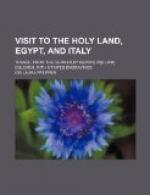Little towers of masonry, on the tops of which telegraphs have been fixed, are seen at intervals along the road between Alexandria and Cairo.
Our vessel was unfortunate enough to strike several times on sand-banks, besides getting entangled among the shallows—a circumstance of frequent occurrence during the time that the Nile is rising. On these occasions I could not sufficiently admire the strength, agility, and hard-working perseverance of our sailors, who were obliged to jump overboard and push off the ship with poles, and afterwards were repeatedly compelled to drag it for half an hour together through shallow places. These people are also very expert at climbing. They could ascend without ratlines to the very tops of the slanting masts, and take in or unloose the sails. I could not repress a shudder on seeing these poor creatures hanging betwixt earth and heaven, so far above me that they appeared like dwarfs. They work with one hand, while they cling to the mast with the other. I do not think that a better, or a more active, agile, and temperate race of sailors exists than these. Their fare consists of bread or ship-biscuit in the morning, with sometimes a raw cucumber, a piece of cheese, or a handful of dates in addition. For dinner they have the same diet, and for supper they have a dish of warm beans, or a kind of broth or pilau. Roast mutton is a rare delicacy with them, and their drink is nothing but the Nile water.
During the period of the inundation, the river is twice as full of vessels as at other times. When the river is swollen, the only method of communication is by boats.
On the last day of this expedition a most beauteous spectacle awaited me—the Delta! Here the mighty Nile, which irrigates the whole country with the hundreds of canals cut from its banks through every region, divides itself into two principal branches, one of which falls into the sea at Rosetta, and the other at Damietta. If the separate aims of the river could be compared to seas, how much more does its united vastness merit the appellation!
When I was thus carried away by the beauty and grandeur of nature, when I thus saw myself placed in the midst of new and interesting scenes, it would appear to me incredible how people can exist, possessing in abundance the gifts of riches, health, and leisure time, and yet without a taste for travelling. The petty comforts of life and enjoyments of luxury are indeed worth more in the eyes of some than the opportunity of contemplating the exalted beauties of nature or the monuments of history, and of gaining information concerning the manners and customs of foreign nations. Although I was at times very badly situated, and had to encounter more hardships and disagreeables than fall to the lot of many a man, I would be thankful that I had had resolution given me to continue my wanderings whenever one of these grand spectacles opened itself before me. What, indeed, are the entertainments of a large town compared to the Delta of the Nile, and many similar scenes? The pure and perfect enjoyment afforded by the contemplation of the beauty of nature is not for a moment to be found in the ball-room or the theatre; and all the ease and luxury in the world should not buy from me my recollections of this journey.




